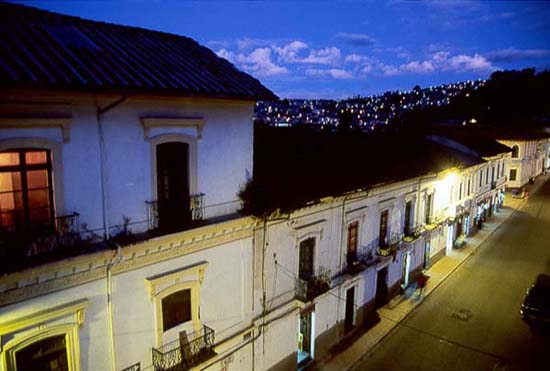
Ecuador RPCV Mark Powell Encourages US Utility Companies to Plant Trees to Battle Pollution
Project Encourages US Utility Companies to Plant Trees to Battle Pollution
Ted Landphair
Morrilton, Arkansas
22 Oct 2003, 16:41 UTC
If you ever took a botany class in school, you learned that actively growing trees are Nature's air purifiers. Through photosynthesis, they absorb carbon molecules from carbon dioxide in the air and turn them into energy. At the same time, they release CO2's refreshing oxygen molecules into the air. In the southern state of Arkansas, environmentalists have turned trees into a frontline weapon against pollution and global warming.
High on a mountaintop in this heavily forested state, Mark Powell is on an ecology walk. Mr. Powell is a former U.S. Peace Corps volunteer who served in the Amazon jungles of Ecuador. Now he's a forester at a unique research foundation called Winrock International. It was established in 1985 by billionaire former Arkansas governor Winthrop Rockefeller on the site of his cattle ranch atop Petit Jean Mountain. The foundation aims to help the world's rural people earn more income - and Mark Powell's work in these woods ties to that effort.
"A lot of these forests up and down the Mississippi River were cleared in the 1960s and '70s for crop production," he said. "This was a time when commodity prices were very high - soybeans, corn. So there were a lot of incentives for farmers to go out and cut down a lot of these bottomland hardwood forests in order to grow crops. Now, in these times of low commodity prices, a lot of farmers up and down the Mississippi River are interested in taking those lands out of production. So we see this as a tremendous opportunity to go back in there and offer these farmers financial incentives to put these lands back into trees under long-term conservation easements [agreements] that will protect those forests for a long time."
Mark Powell says that even though the United States has not ratified the Kyoto Protocol - the 1997 international agreement that would regulate so-called greenhouse gases - utility companies foresee the day when they'll be penalized for allowing carbon dioxide emissions from their big, coal-fired power plants.
One option would be to install expensive scrubbers to clean up the power-plant emissions. But another is to pay for the planting of trees, which are Nature's air scrubbers. In return, the utilities receive so-called carbon credits that allow them to keep their polluting plants in operation. Just this year, carbon credits began being traded on a new market called the Chicago Climate Exchange.
"If one company is exceeding an agreed-upon target in emissions, it can buy credits from another company that is within its target emissions," Mr. Powell said.
Winrock International is the middleman in a model program it hopes will spread worldwide. It obtains payments from utilities with generating plants in the Mississippi River Delta region, then turns the money over to landowners who agree to convert crop and bottomland into forests. This past year, 1,000 hectares immediately adjacent to power plants were planted with trees.
"We're sitting on the Promised Land of carbon offsets, right here in the delta of the U.S. because you've got hundreds of thousands of hectares of marginal cropland, up and down the Mississippi River, that really needs to go back into trees," Mr. Powell said. "And as you're creating those forests, they're extremely important for wildlife habitat, a huge diversity of plants, and also improving water quality. The utility companies right now are interested in not just carbon offsets, but in all those other benefits. There's a lot of P.R. [public relations] to it right now."
Winrock calculates the amount of carbon sucked out of the air by first measuring the diameter of trees in a small, sample plot - then magnifying those calculations to fit the entire biomass of the tract - roots, trunks, branches, stems, leaves and all.
"The actual carbon in all of that biomass is 50 percent of that," Mr. Powell said. "One hectare of bottomland forest would accumulate about 250 tons of carbon."
More trees equal more carbon that's sequestered, or removed, from pollutants in the air. Mr. Powell says new forests also mean new wildlife habitats from which property owners can make additional money by leasing the land to hunters.
Mark Powell at the Winrock foundation admits that this tree planting, carbon credit project is not without its detractors. Critics say it's a minuscule solution to the global problems of pollution and atmospheric warming.
"They're saying that utility companies are getting off cheap," Mr. Powell said. "They're offsetting these emissions that are spreading to the northeastern U.S. by planting trees out in the Delta. That's not helping the problem up in the Northeast. And that's true. You could plant every available space there is with trees, and it would not offset the emissions that are being produced right now."
One key remaining question is, where would the money come from to vastly expand the carbon-sequestration program, so that newly planted trees could work their magic on pollution around the world?
